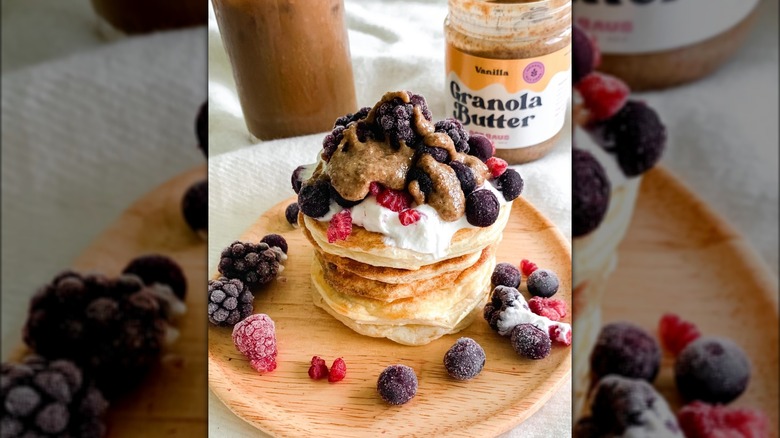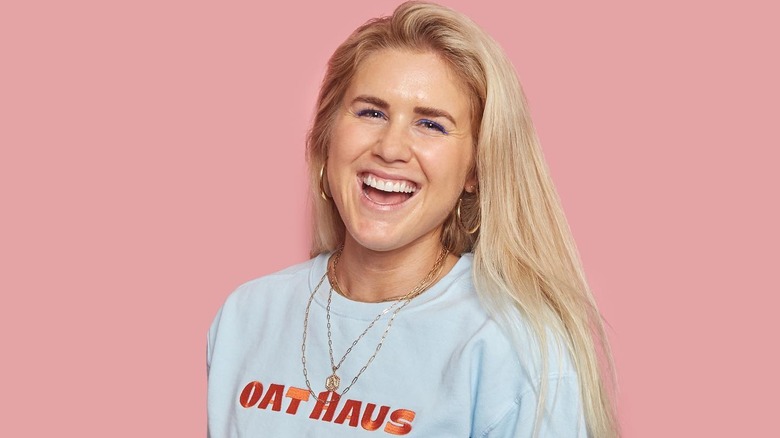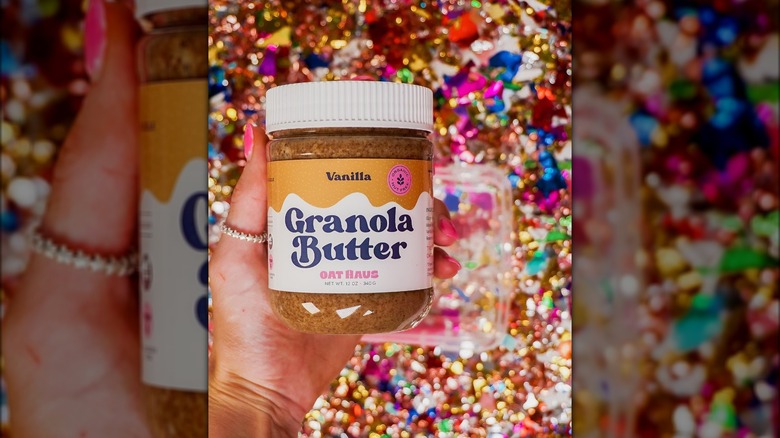Here's What Happened To Oat Haus Granola Butter After Shark Tank
Looking for something rich and creamy to spread across your toast or dollop on top of your oatmeal? Look no further than Oat Haus granola butter, a spreadable condiment that's a hearty alternative to peanut butter for those who can't eat nuts. The brand's website describes its original flavor as tasting like cinnamon graham crackers, made with gluten-free oats, olive oil, maple syrup, flax, coconut oil, and warming spices. The product appeals to those with food sensitivities as it is gluten-free, vegan, kosher, and free of the top eight food allergens — which are milk, eggs, fish, crustacean shellfish, tree nuts, peanuts, wheat, and soybeans.
You may recognize this product from "Shark Tank," but prior to its television appearance, Oat Haus was known as Kween, and it was founded in 2018 by CEO Ali Bonar (via Philadelphia Magazine). In its short lifespan, Oat Haus has celebrated a lot of success. Bonar had already tapped Pressed Juicery and Whole Foods to sell the granola butter before appearing on "Shark Tank," according to Shark Tank Blog. In addition, she and her co-founders had recently relocated to Philadelphia to establish a production facility for Oat Haus, reported WPVI-TV Philadelphia. By then, getting in front of the Sharks seemed like the next big move for the brand. After applying four different times, this finally happened for the founders during Season 13, Episode 3, which aired in October 2021.
Did the Shark Tank investors like the idea of Oat Haus Granola Butter?
On "Shark Tank," CEO Ali Bonar and her team pitched Oat Haus as "the next generation of granola." She revealed that the brand was born during her recovery from an eating disorder, which gave her a sensitivity to peanut butter and other nut-based foods (via YouTube). She got the idea for an oat-based spread, tinkered with the recipe with her boyfriend and co-founder Eric Katz, and chef Ari Schraer, and ended up founding a business that had racked up $2.7 million in sales by the time it went on "Shark Tank."
After their enthusiastic pitch, which included choreographed dance moves, the creators let the Sharks taste their four signature flavors; original, vanilla, chocolate, and blueberry, and then asked the Shark Tank panel for $375,000 for 5% equity. After the tasting, the investors praised the aroma and taste of the overall product and were impressed with its resemblance to regular nut butter. However, Kevin O'Leary was not thrilled about the texture, comparing it to a liquidy soup. Mark Cuban said Oat Haus wasn't different enough from other spreads, Daniel Lubetzky was deterred by the founders bringing up an exit opportunity, and the rest just didn't believe in the product enough to invest. On business strategist Joe Pardo's YouTube pitch recap, most commenters expressed disagreement with the Sharks' decision, saying they love Oat Haus for its unique premise and taste. It turns out they're not the only ones.
How Oat Haus Granola Butter performed after its Shark Tank rejection
Despite not receiving an offer from the Sharks, Oat Haus appears to be doing pretty well for itself after appearing on the show. The founders revealed to the Philadelphia Business Journal that interest in their company and most importantly sales boomed after the release of the episode. CEO Ali Bonar was still frequently releasing episodes of her lifestyle podcast, Alicast, into 2022. She started the project before Oat Haus' rebrand and speaks about all things food, body image, and business. The Oat Haus website also features an updated blog that shares amazing and delicious recipes using the company's signature flavors as well as lifestyle tips. Furthermore, the brand continues to use social media to market its products, which has recently included bringing on actress Jameela Jamil as a social impact adviser and posting on TikTok with giveaway competitions.
Bonar and her team have also rolled out new granola butter flavors, such as birthday cake to celebrate the brand's anniversary as well as brownie batter, red velvet, cinnamon roll, cookie dough, and strawberry shortcake. Each 12-ouce jar costs $12.95 with discounts for bulk orders. The brand has expanded to new retailers since "Shark Tank," too, and is now available at Sprouts, Harris Teeter, Whole Foods, Wegmans, and Target. Considering its nearly 100,000 followers on Instagram, and over 63,000 followers on TikTok, the brand has built a loyal community and seems poised to stick around.
What does the future look like for Oat Haus?
After the letdown of not getting backers from the popular "Shark Tank" appearance, Oat Haus seems to not only be surviving after the experience, but thriving as well. Since the show aired, the company has increased its flavor profile and is now found in more stores around the United States than before it graced the stage of "Shark Tank." The new flavors have even received high praise from critics. Vice writer Nicolette Accardi said the Oat Haus Cookie Dough tastes like a "classic Toll House cookie," adding that "I've developed a taste for this stuff and become a certifiable granola butter fiend."
Even with its success, the company has stuck to its tried and true do-it-yourself way of doing business. In one TikTok video, Oat Haus shared how it makes, manufactures, packs, and ships all of its own products, ensuring it has complete creative and quality control over its granola butter. Although this can come with hardships and limitations, there is a sense of respect for the company wanting to do it on its own. However, these processes would be fruitless if Oat Haus didn't have the support of the consumer. Another video shares that the company earned $100,000 in just 24 hours when it introduced its red velvet flavor. So even though it might not have gotten the support it wanted while pitching "Shark Tank," it seems like it's smooth sailing for Oat Haus Granola Butter.



